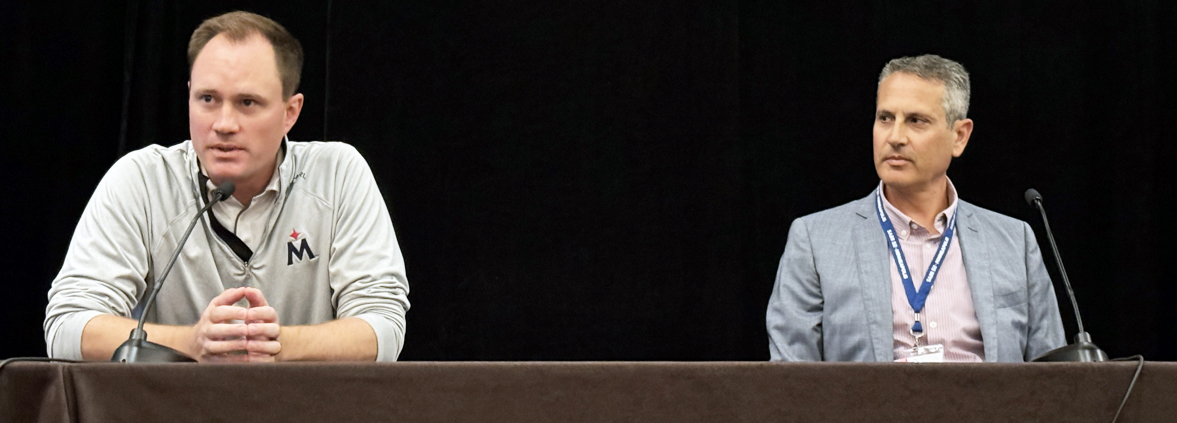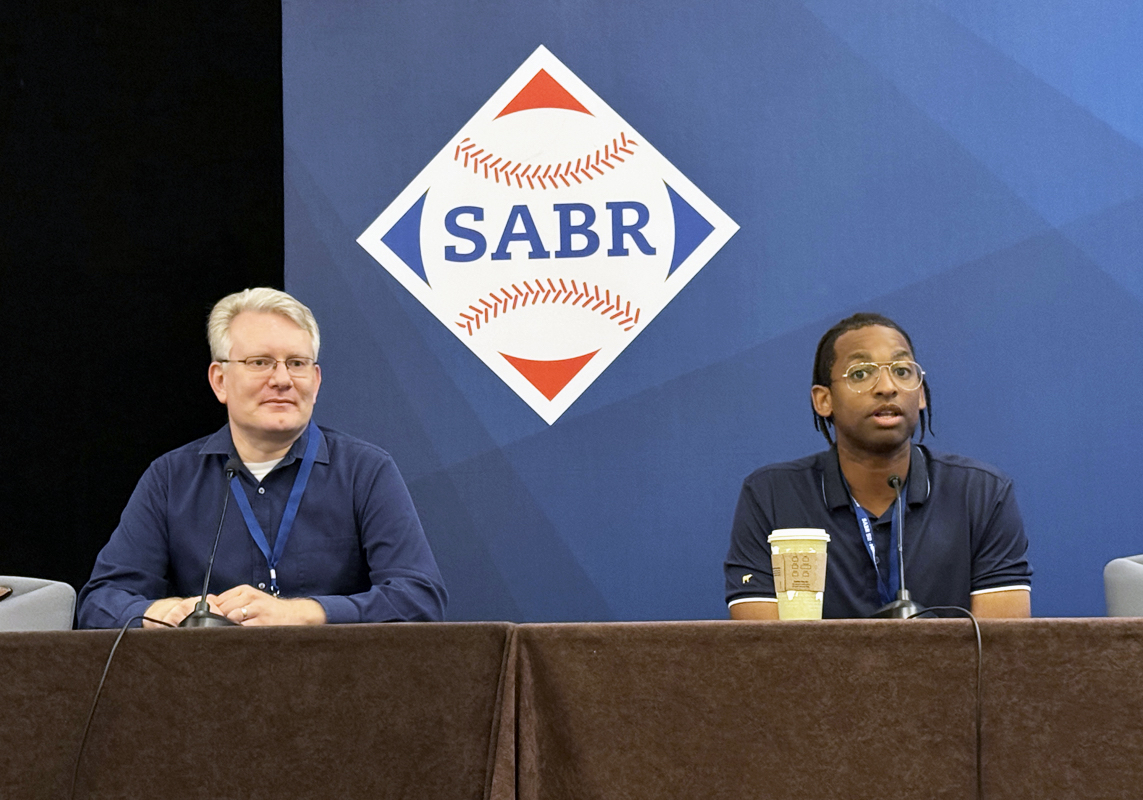SABR 52: Listen to highlights from the Minnesota Twins Analytics Panel with Thad Levine, Josh Kalk, Jeremy Raadt, Josh Ruffin
On Friday, August 9, 2024, the SABR 52 Minnesota Twins Analytics Panel was held at the Hyatt Regency Minneapolis. The panel included Thad Levine, the Twins’ Senior Vice President and General Manager; Josh Kalk, Vice President, Baseball Operations Strategy & Innovation; Jeremy Raadt, Vice President of Baseball Systems; and Josh Ruffin, Assistant Director of Player Development Research.
Since Levine’s hiring as GM in November 2016, the Twins have won three American League Central Division titles and qualified for four postseason appearances. The team also set a single-season major league record with 307 home runs in 2019 when they won 101 games. Previously, he spent 11 seasons as an Assistant General Manager for the Texas Rangers, a period that included two World Series runs. He has also worked with the Colorado Rockies and Los Angeles Dodgers.
Kalk is in his seventh season with the Twins, where he leads the advance scouting team and assists the major league staff and player development personnel with unique information and ball-tracking data. Prior to joining the Twins in 2017, he spent nine seasons in the Tampa Bay Rays front office. He holds a Master of Science degree in Physics from Michigan State University and a Bachelor of Science degree in Physics and Mathematics from the University of Wisconsin-River Falls.
Raadt joined the Twins in 2014 as the club’s first baseball systems developer. His responsibilities include leading the baseball systems team as they develop applications and software for use across all areas of the baseball operations department, from player development and scouting to analytics. Previously, he worked at MinuteBids, Access Genetics, and at his alma mater, Bethel University, where he graduated with degrees in computer science, business finance and small business management.
Ruffin works closely with the affiliate coaching staffs to develop minor league prospects. He joined the organization in 2019 as an Advance Scouting Analyst in the major league clubhouse. A former pitcher for Duke University, he graduated with a degree in Statistical Science in 2014, and earned his Master’s degree in Data Analytics Engineering from George Mason University. He has also served as a Data Analyst in numerous efforts supporting the United States Government, including the US Army, Navy, and Department of Agriculture.
- AUDIO: Listen to highlights from the SABR 52 Minnesota Twins Analytics Panel (38:47; MP3)
Here are some highlights:
ON COMMUNICATING ANALYTICS WITH PLAYERS
- Ruffin: “We really try and focus on meeting the players where they’re at. … One big thing we do is we try to fight to make sure we have at least one coach at each affiliate (minor league) level who can speak Spanish, so we can reach out to everyone who is on our team. We have different analysts who are flying in, who can check in, and see the affiliates directly, see what the processes look like. … You get to see what they’re doing in action, so you can see where that gap is. If we see the information that’s being passed along is too complex or too busy, we’ll find ways to simplify it. If you think our players are getting a little older and they can handle a little more, their cups are getting bigger, then we’ll sit there and allow them to go as we can.”
ON HOW TO FIND AND SEPARATE USEFUL DATA
- Raadt: “There is an absolute sea of data. We can get 7 terabytes of data just off of one game, from all of the tracking systems that we have today. So how do we make that so the pitcher after the game understands how he performed and how he can get better for the next start? That’s what makes a good team good, is being able to do that. … We have extremely talented folks who can take that information down and also understand that each player is an individual.”
- Levine: “We embed people from our analytics teams within each of our departments. So we have real-time feedback from those departments. It’s not abstract. We have people embedded in our player development, our strength and conditioning, our medical staff, in each of our scouting groups, so they’re living day-to-day with those guys and understanding exactly the practical application of every tool we’re building. It’s being honed on a day-to-day basis by the end user.”
ON ADVANCE SCOUTS AND HOW TO PREPARE PITCHERS
- Levine: “It used to be when you were advancing for an opposing team, you’d sit in a relatively large room with your whole pitching staff there, and you’d go over every single hitter and tell them, ‘This is how we pitch each single guy.’ And if the guy learned that way, great. And if he didn’t, he was going to struggle. … Now we are meeting with guys on an individual basis. Some guys are visual learners, some guys are audible learners, some need video, some need handouts given to them. I think what Josh (Kalk) does masterfully is the art form of conveying some of this information in the best way to ultimately make it actionable, rather than just a piece of paper that sits in a player’s locker and isn’t utilized.”
- Kalk: “These players are human beings, and that fact is not lost on the people up here. … While we certainly have things that we’re thinking about, when a player comes into our organization, we really try to give them some time to be themselves, to get used to us and to (let) us get used to them, before we jump on them with some adjustments, whether that’s through a trade or the draft.”
For more coverage of SABR 52, visit SABR.org/convention.
Originally published: August 19, 2024. Last Updated: August 19, 2024.





